We love our little fur babies and do all we can to give them a happy and healthy life. Sometimes this can be a challenge though.
One problem I see a lot of dog owners struggle with is how to stop a dog from chewing on everything in sight!
And I mean everything; stone, wood, shoes, cat litter, phone books, your fence...
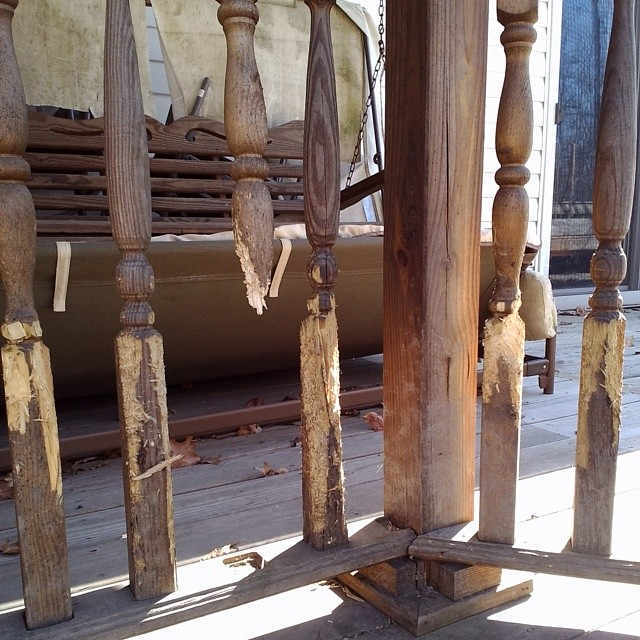
Uh oh, someone was naughty.... image via instragram/domall60
What makes them do this? Well, part of solving the issue is understanding what is motivating your puppy or adult dog to chew in the first place.
There are a number of reasons, like teething in puppies, a lack of exercise in older dogs, or separation anxiety. It also takes patience to resolve the problem. It's not impossible to stop your dog from chewing and this is what I am going to share with you today. So, let's jump right in!
Puppy Chew Issues
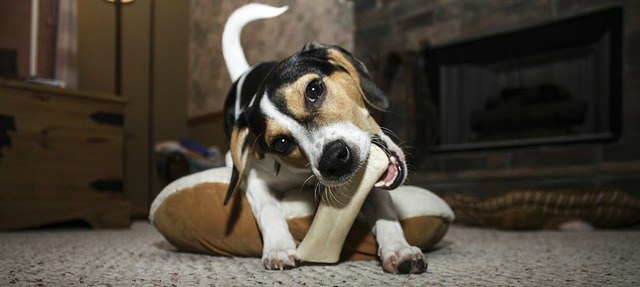
It's actually quite normal for puppies to chew on stuff when they are eagerly exploring their surroundings.
It has a couple of benefits for puppies, such as relieving pain when their teeth start to come in.
It helps build the muscles in their jaws and is how they keep those teeth clean when they do get them. It's also a way that they deal with anxiety, boredom, and frustration.
This is commonly referred to as “destructive” chewing.
Let's have a closer look at why puppies chew on anything and everything!
Boredom
Puppies are active and need a lot of exercise and attention. If you leave them alone for too long or aren't giving them that physical and mental stimulation they need, they get bored.
Boredom can then lead to chewing everything and anything that looks interesting.
Teething
Between the ages of 3 to 7 months, your young friend starts to get their teeth. This can be painful for them and the only way they know how to relieve this is by chewing on something. It's an uncontrollable urge for them.
By chewing, they not only relieve their gum pain, but it works to help remove those baby teeth and allows adult teeth to break through the gums.
Attention-Seeking
Sometimes your puppy chews to get your attention.
They kind of put two and two together when they chew on something they are aware of is “forbidden”, and this leads you to chase them around.
It's like kids who act out because they know it will get a reaction or attention from you.
Unbalanced Diet
Puppies will chew on anything! Nothing is safe from them. For example, puppies who have an unbalanced diet that lacks in calcium will start to chew on things like plaster or rocks. If they can get it in their mouths, they are going to chew on it.
Distress
Some puppies will chew on things when they feel anxious or distressed, such as with separation anxiety. They may not be able to cope well when you leave them, which can lead to destructive chewing when you do.
4 Tips on How to Stop a Puppy from Chewing
All puppies need to chew, there is no way around this. But if you give them the right toys to chew on and train them to understand what is not acceptable to chew on, you will both be much happier.
Let's have a look at how you can stop your puppy from chewing on the wrong things and to start chewing on the right things.
1. Using a Crate or Baby Gate
When you need to leave your puppy alone or unattended, using a crate or baby gate to keep them sequestered will help.
Crate Training
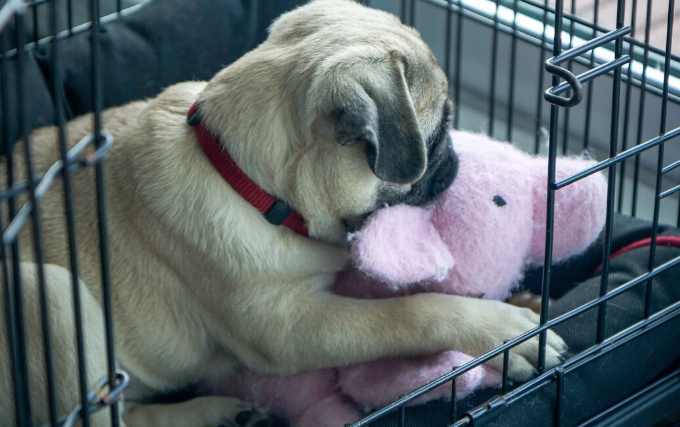
A crate can offer your puppy a safe zone during stressful times, like when left alone, car rides, or visits at the vet.
When you put your puppy in its crate, make sure you have some acceptable chew toys in there with him. It will get them used to chewing on the right things. I'll go over some good chew toys for puppies in a bit.
Things you should not give your puppy to chew on are old items that resemble new ones in the home. Puppies can't tell the difference between an old shoe and your favorite new shoe. Things like old towels, old shoes, pieces of scrap wood, or old books are not acceptable to use as a chew toy.
When it comes time to leave the home, put your puppy in its crate with the toys and leave. Don't make a big production out of it with long goodbyes or gestures that seem threatening. A simple “see you later buddy!” is all that is needed.
Remember, every puppy develops at their own pace, and there are different methods you can try when crate training.
Baby Gate
Using a baby gate gives you a way to keep your dog in a chew-proof area of the home. Some owners will graduate their puppies from a crate to an area of their own.
Just like the crate, make sure your puppy has a variety of chew toys in their area.
Also, make sure you remove any forbidden objects that you don't want them to chew on. You can also use a baby gate to block off certain areas of the home.
One thing to keep in mind is to choose a gate that is not only sturdy but chew proof - like the Stairway Special By Cardinal Gates - all metal built and includes a latch, making it very durable.
Plastic and wood gates may not cut it. Steel is a good option but you need to make sure it doesn't have a toxic coating on it.
2. Use Chew Toys
Finding the right chew toys for a puppy that is teething is important. They need to be size and age-appropriate to start with. Some toys for a 10-week old puppy could be a choking hazard to a puppy that is 6 months old.
A teething puppy needs a chew toy that is soothing to their sore gums. A good example is Nylabone's Puppy Chew Teething Pacifier. It has two chew toys on a ring that have nubs all over them that stimulate the gums and incoming teeth. It also teaches them some healthier chewing habits. Nylabone has a nice range of teething specific toys.
Kong also makes a variety of chew toys for puppies, like their rubber Puppy Toy. It not only soothes their gums but also their instinctive need to chew. It also bounces, which makes it a good toy for playtime.
3. Use "Chicksickles"
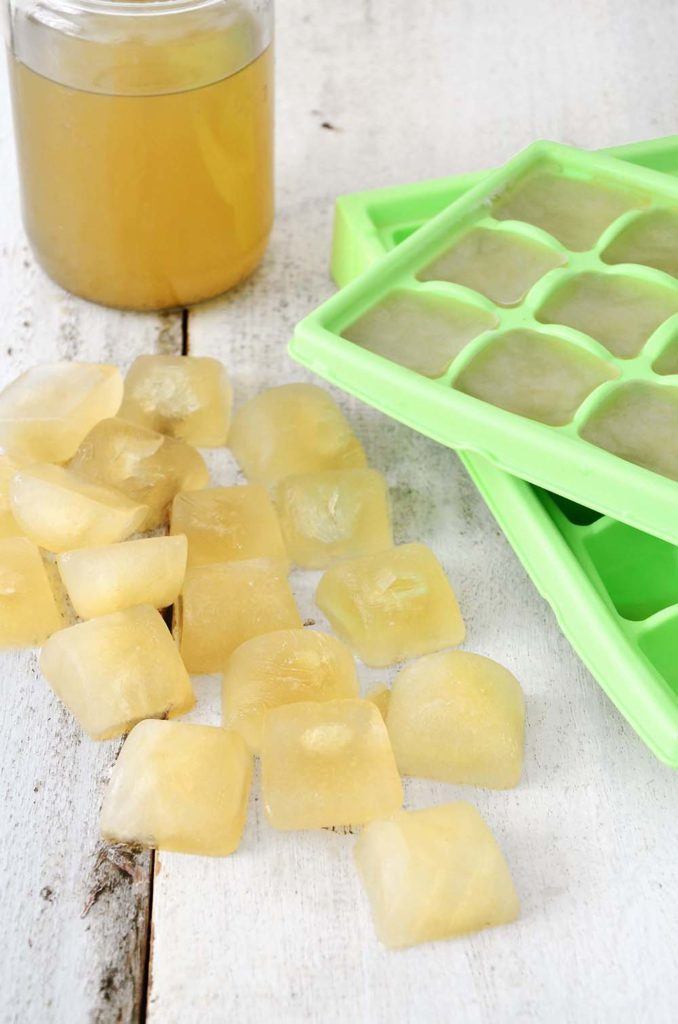
Image via TemperoAlternativo
You can actually use some things around the home to create a cool soothing remedy for your puppy to relieve gum pain from teething. Ice cubes are a great choice for this, or you can make tasty frozen treats like “chicksickles”.
Using some chicken broth, you can freeze it into cubes to give your puppy. So, they are not only getting a tasty treat, but a way to ease their sore gums as well.
If you have a chew toy that is designed to be frozen and lets you insert treats into it, such as the Kong toy mentioned earlier, you can freeze fruit, vegetables, ice cubes, peanut butter, or frozen broth cubes and put them inside the toy. It will make the treat last a bit longer while soothing your puppies' gums.
Just be sure that whatever you are putting into the treat is something safe for puppies. Fruits and vegetables that are safe are carrots, pumpkin, bananas, and blueberries. You can also use peanut butter!
4. Use Training Commands
Getting your puppy to stop chewing on the wrong thing, whether it's from teething or not, takes a bit of training. You can do this using the “leave” command when you want them to leave something alone.
This type of training teaches them not to get anxious when you have taken away a forbidden object by having you replace it with an appropriate chew toy. They equate having something taken away with being given a reward.
The main thing is to replace the forbidden object with an acceptable chew toy and make sure to give them lots of praise.
Adult Dogs Chewing Issues
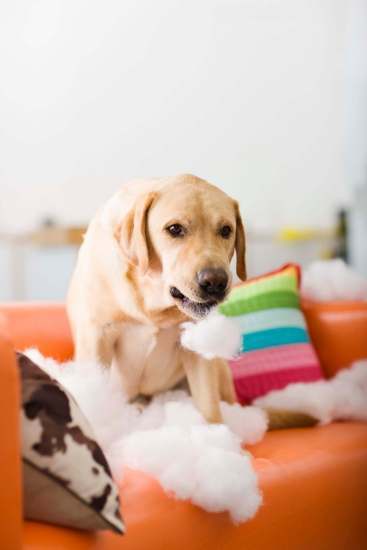
A bored or frustrated dog may take out its frustrations through chewing
We've looked at why puppies chew on everything, now let's look at what makes adolescent dogs chew. Like puppies, adolescent dogs need to chew to keep their jaw and teeth strong. Your dog may not have had a chewing issue before, and then suddenly starts gnawing on your furniture.
You first need to see what the underlying cause is of their chewing.
We had a rescue dog who had separation anxiety from its last owner. So, when we left him home for longer than usual one day, we came back to find the couch cushions shredded!
Other things, like boredom and not getting enough exercise are also reasons for an older dog to chew on things.
Boredom and Exercise
Your dogs' chewing can be a response to changes in their activity levels, resulting in boredom. For example, let's say you spend a lot of time at home but now have a part-time job. The exercise your dog may have been getting during the day has suddenly stopped. You're not home to entertain them, so they have nothing to mentally stimulate them.
Another scenario is when you have to limit your furry friend's physical activity due to them having a health issue.
Chewing as a result of boredom or changes in their activities is your dogs' way of telling you they are not adjusting to the change and need more stimulation.
In cases where they are recovering from some health problems, you will need to find other ways to stimulate them. For healthy dogs, you will need to increase their exercise or playtime. In both cases, you can introduce some fun and challenging chew toys for them to play with.
Tip: It's always good to rotate your puppy or dog's toys so they don't get bored with them.
Anxiety and Chewing
Sometimes adolescent dogs experience separation anxiety as they age. If they have been ill, it can give rise to a fear of being away from you. Other reasons for this anxiety are a result of hormonal imbalances, such as hypothyroidism. Or, in cases where its a rescue dog that was abandoned, they fear being abandoned again every time you leave.
Chewing is a dog's way to calm their nerves. It's stress relief, like squeezing a rubber ball for humans.
Behavioral Issues and Chewing
There are some behavioral issues that can lead to chewing in dogs, such as fabric sucking. You can see this with puppies and older dogs.
This behavior is a result of them having been weaned from their mother too early.
Sometimes, this type of behavior becomes compulsive and will need a behavioral specialist to help them break the habit.
Hunger and Chewing
We see chewing from hunger in dogs who have been put on a restricted diet. To find some added nutritional sources, they resort to chewing everything.
Mainly, it will be objects that smell like food or that are linked with food, like a wooden spoon or getting into the garbage to chew on foil packets that had food in them.
3 Tips on How To Stop Mature dogs from Chewing Everything
1. Exercise and Stimulation
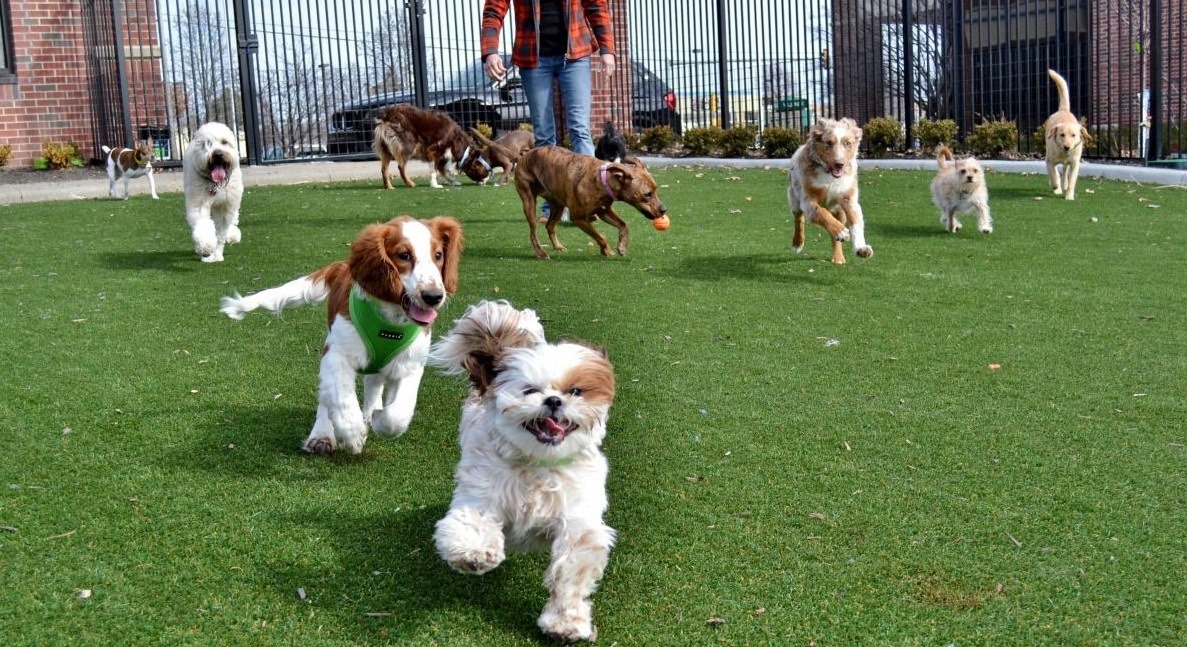
If you're away for most of the day, consider bringing your dog to a "doggy daycare" rather than leaving him at home alone.
As mentioned earlier, some dogs will chew when they are bored. The way to sort this out is by giving them more exercise to stimulate them physically.
Going for longer walks or letting them out in the yard for longer periods often goes a long way in helping to break the chewing from boredom habit.
Another option is taking them to a dog park so that they can interact with other dogs. This helps stimulate their bodies and minds.
Play more games with your dog, like fetch or with a frisbee, or do some clicker training to get your dog's mind engaged.
2. Professional Dog Sitters
If you are in a position where you don't have the time to get in some extra activities for your dog, you may want to consider hiring a professional dog walker or dog sitter.
They can make sure your dog is getting out and playing enough, exercising, and going for interesting walks. It's what they have been trained to do!
A dog sitter can be a good option for when you have to leave your dog alone for long periods. It can help with separation anxiety, loneliness, and boredom.
Professional sitters and walkers are trained with the skills needed to entertain and look after your dog to keep them healthy and happy.
3. Toys For Mental Stimulation
Another thing to look into, when your dog is left on their own, are toys that are mentally stimulating, such as durable dog puzzles and treat dispensers.
An example is the Buster Cube from Our Pets. You fill it with your dog's favorite treats and they have to figure out how to get them. It has adjustable holes to make the puzzle more challenging.
Another option is the Classic Dog Toy from Kong. It's made of durable rubber for chewing that they can bounce, fetch, and which can be filled with treats to entice them to play more. It stimulates the mind and body while detracting them from chewing on things they shouldn't.
Here's a good list to give you some ideas of what you can stuff in your dog's Kong toys.
Consider Online Training Courses
There are two good online video based training courses that we recommend and can both help with destructive chewing behavior in dogs.
Both courses are good but they serve two very different purposes. The Doggy Dan online course tackles behavioral problems like excessive barking and aggression in ways that are creative, kind and most important - effective!
Brain Training For Dogs uses 21 brain training activities and is an excellent course for bored dogs that get destructive. Dogs that are bored tend to get into trouble by looking for ways to entertain themselves. This course is a great fun boredom buster that goes from easy to very advanced. If you think your dog is chewing out of boredom this video course is a good choice.
Final Note on Destructive Chewing...
We now know that chewing is a healthy and necessary thing for puppies and dogs, and we need to provide them with the right chew toys for their development.
We have also learned that destructive chewing happens for underlying reasons, but you can train your puppy or dog to stop this kind of destructive behavior, which is a relief for dog owners around the world!

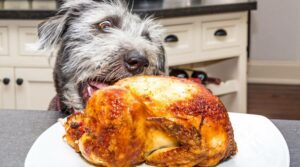


I think like a lot of behaviour in dogs, chewing comes down to training from the owner. Chewing isn’t behaviour that they are going to grow out of when they are puppies but with training any dog can learn to stop. I found with my Husky the best way was with chew toys especially a rope. Going for regular walks and getting exercise was important as well. Great article!